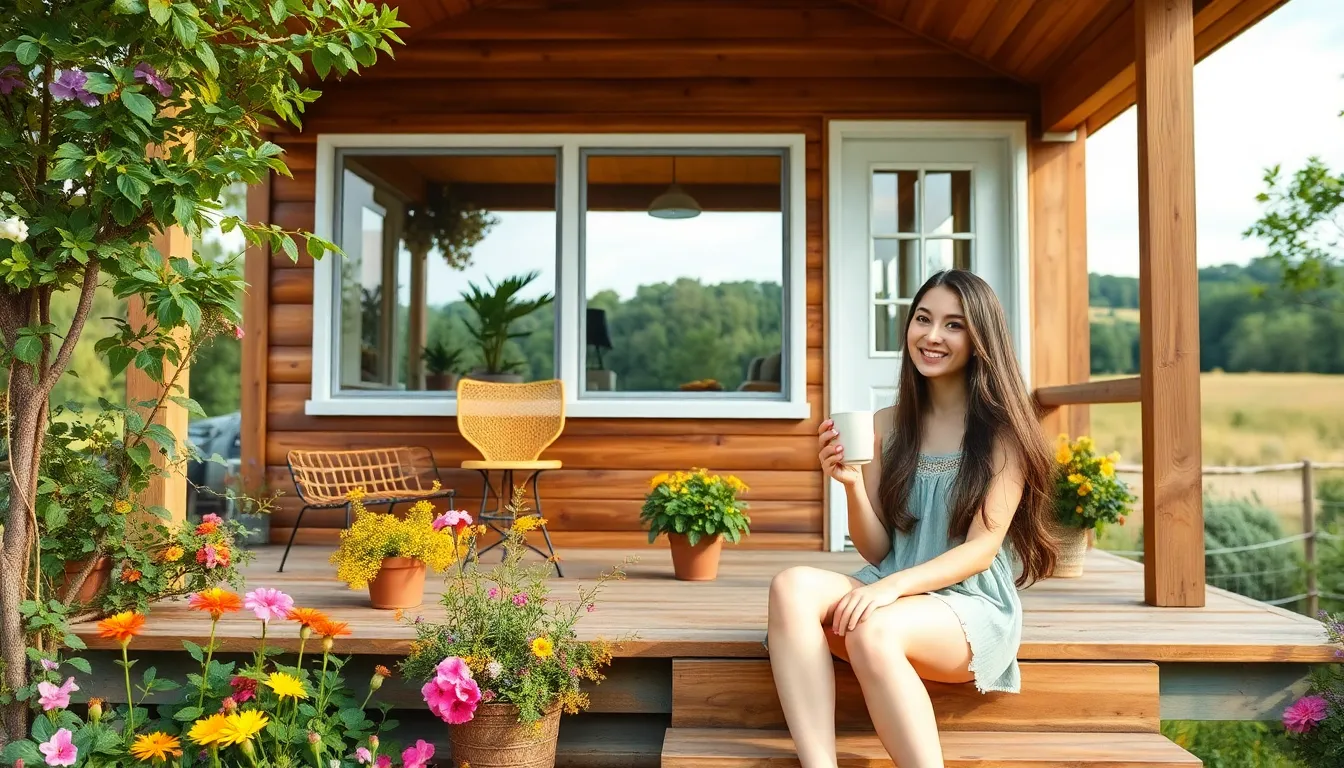Table of Contents
ToggleIn the land of towering mountains and sprawling evergreen forests, Washington State is now embracing a trend that’s anything but big: tiny homes. These pint-sized abodes are popping up everywhere, offering a cozy escape from the chaos of urban living. Imagine trading your sprawling McMansion for a charming little retreat that fits snugly into your budget and your backyard.
Overview of Tiny Homes
Tiny homes offer a modern solution to the challenges of high living costs and environmental concerns. These compact dwellings typically range from 100 to 400 square feet, providing a minimalist lifestyle that resonates with many buyers. Emphasizing functionality, tiny homes incorporate multi-purpose furniture and smart designs to maximize space.
Affordability stands as one of the primary advantages of tiny homes. The average price for a tiny home in Washington State varies between $50,000 and $150,000. Comparatively, traditional homes in the area can exceed $350,000, making tiny homes a viable option for first-time buyers and those looking to downsize. Reduced utility costs also contribute to financial flexibility, enhancing the overall appeal.
Sustainability plays a crucial role in the tiny home movement. Many tiny homes utilize eco-friendly materials and energy-efficient appliances. Builders often install solar panels and rainwater harvesting systems, further reducing the ecological footprint of these residences.
Community is another significant aspect. Tiny home villages are emerging across Washington State, fostering connections among residents. These communities offer shared amenities, such as gardens and communal spaces, creating a supportive environment that aligns with the values of minimalism and togetherness.
Regulations can vary by city or county, creating challenges for prospective buyers. Zoning laws often dictate where tiny homes can legally reside, prompting buyers to research local regulations thoroughly. Certain areas may offer opportunities for placing tiny homes on private land or within established tiny home communities.
Tiny homes present an appealing option for those interested in affordability, sustainability, and community living. As demand increases, the tiny home market in Washington State continues to grow, with more listings appearing regularly.
Benefits of Living in Tiny Homes

Tiny homes offer various advantages for those considering a smaller living space in Washington State. Affordable prices and eco-friendly designs are two primary benefits attracting many buyers.
Affordability
Affordability ranks among the top reasons individuals choose tiny homes. Prices of tiny homes typically range from $50,000 to $150,000, making homeownership accessible for many. Traditional homes in Washington might exceed $350,000, making tiny homes an attractive alternative for budget-conscious buyers. Lower utility costs accompany tiny living, as reduced square footage often results in decreased energy bills. Smaller mortgages mean potential savings for investing in travel or experiences. Financing options for tiny homes continue expanding, providing easier paths to ownership.
Environmental Impact
Environmental impact stands out as another significant benefit of tiny homes. Many tiny homes incorporate eco-friendly materials, reducing the carbon footprint associated with construction. Energy-efficient appliances often feature in these homes, aiding in conservation efforts. Smaller living spaces promote conscious consumption and waste reduction too. Living in a tiny home allows individuals to embrace a minimalist lifestyle, emphasizing sustainability. With less space for excessive belongings, tiny homeowners are more likely to prioritize what truly matters, fostering a deep connection with the environment.
Popular Tiny Home Communities in Washington State
Tiny home communities in Washington State offer a unique living experience, blending affordability with a sense of belonging. Residents enjoy close-knit relationships, supporting a vibrant community lifestyle.
Community Features
Shared green spaces enhance community interactions while promoting sustainability. Often, tiny home villages include communal gardens where residents can grow food together. Regular community events foster connections among neighbors and create lasting friendships. Various housing styles within villages support diverse tastes and preferences while maintaining affordability. The smaller community size allows for intimate gatherings, encouraging a friendly atmosphere.
Available Amenities
Amenities often include communal kitchens and laundry facilities, making everyday tasks convenient for residents. Many communities incorporate recreational areas featuring picnic tables, fire pits, and playgrounds for families. Some even provide shared resources such as tools and workshop spaces for DIY projects and crafting. Eco-friendly features, like solar panels and rainwater collection systems, further enhance living quality. Residents appreciate nearby access to shops, parks, and public transportation, ensuring convenience in daily life.
Finding Tiny Homes for Sale in Washington State
Locating tiny homes for sale in Washington State involves several strategies. Prospective buyers often look for diverse options across various platforms.
Online Listings
Numerous websites showcase tiny homes available in Washington State. Listings on popular real estate platforms feature detailed descriptions, photos, and pricing information for homes ranging from $50,000 to $150,000. Websites like Zillow, Tiny House Listings, and Realtor.com often provide filters specifically for tiny homes. Regular visits to these sites can yield new opportunities. Buyers can also subscribe to alerts to receive notifications about new listings in their preferred areas. These online resources offer a comprehensive starting point for those interested in compact living.
Local Real Estate Agents
Local real estate agents possess valuable insight into the tiny home market. Many agents specialize in alternative housing and understand the unique regulations and opportunities within Washington State. They often have access to listings not found online and can provide guidance through the purchasing process. Building a relationship with a knowledgeable agent can facilitate smoother navigation of zoning laws and financing options. Real estate professionals also offer insights into emerging tiny home communities and upcoming developments. Leveraging their expertise can shorten the search process significantly.
Financing Options for Tiny Homes
Financing options for tiny homes in Washington State vary significantly. Traditional mortgages often cover larger homes, but alternative financing like personal loans or specialty lenders can benefit tiny home buyers. Many buyers consider RV loans viable since many tiny homes are classified as recreational vehicles.
Moreover, some credit unions and community banks provide tailored lending solutions for tiny homes. These institutions often understand the unique nature of tiny home ownership, offering flexible terms. Buyers explore options such as FHA loans under specific conditions, which may cover some types of tiny homes.
A significant number of individuals find crowdfunding a novel approach for financing their tiny home. Online platforms allow potential homeowners to present their tiny home projects and attract financial support from family, friends, and interested investors.
Grants and loans from local governmental programs also assist aspiring tiny home owners in certain areas. Some initiatives in Washington State promote sustainable living, offering financial aid for eco-friendly constructions.
Those interested in tiny home financing often evaluate their credit scores first. Higher credit scores can secure lower interest rates and better terms. Additionally, potential homeowners benefit from clear budgeting of costs for land, utilities, and maintenance.
Homebuyers must understand tax implications related to tiny home ownership, such as property taxes differing by location. Consulting with financial advisors specializing in alternative housing ensures informed decisions, creating a smoother home-buying experience.
Tiny homes in Washington State represent a unique opportunity for those seeking a simpler and more affordable lifestyle. With their eco-friendly features and strong sense of community, these homes cater to a growing demand for sustainable living. As more individuals embrace the benefits of downsizing, the tiny home market continues to expand, offering diverse options for prospective buyers.
Navigating the challenges of zoning laws and financing may require some effort, but the rewards of tiny home living can be significant. Whether it’s the allure of lower living costs or the chance to connect with like-minded neighbors, tiny homes provide a refreshing alternative to traditional housing. For anyone considering this lifestyle, Washington State’s vibrant tiny home communities offer an inviting path forward.



